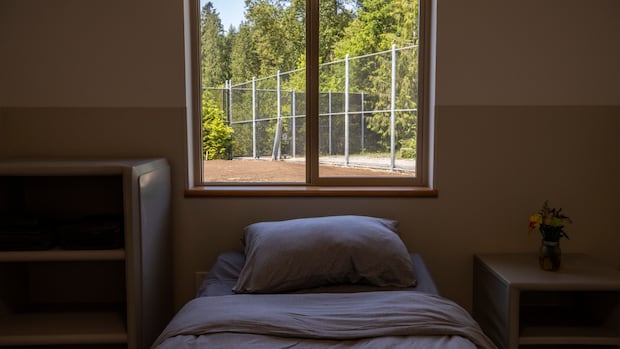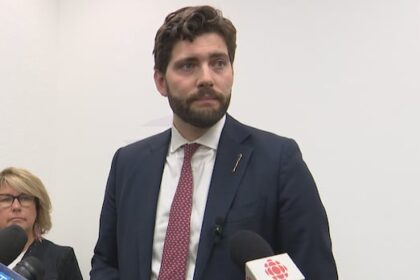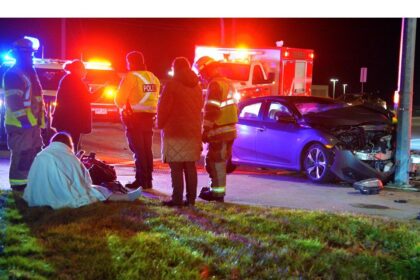British Columbia·CBC ExplainsInvoluntary care was put in the spotlight last fall during the provincial election campaign when Premier David Eby announced plans to expand that type of care for people with addiction. The B.C. Conservative Party also included involuntary care legislation in its platform. Anyone admitted under involuntary treatment must meet a specific set of criteria, the province saysCBC News · Posted: Sep 29, 2025 1:03 PM EDT | Last Updated: 2 hours agoInvoluntary care was put in the spotlight last fall during the provincial election campaign when Premier David Eby announced plans to expand that type of care for people with addiction. (Ben Nelms/CBC)Involuntary care. It’s a legal process that has existed for a long time, but has gotten more attention in British Columbia as the province has looked to expand treatment for those suffering from mental illness and addiction.Involuntary care was put in the spotlight last fall, during the provincial election campaign, when Premier David Eby announced plans to expand that type of care for people with addiction. The B.C. Conservative Party also included involuntary care legislation in its platform. In March, the province’s recently-appointed chief scientific adviser for psychiatry shared guidance for clinicians who may be making decisions about involuntary care for adults in B.C. with substance-use disorder. In early June, the province announced 18 new long-term involuntary care beds in a Maple Ridge, B.C., mental health facility. WATCH | New involuntary care beds coming to B.C.: B.C. Premier David Eby announces two new involuntary care sitesB.C. Premier David Eby addressed the Union of B.C. Municipalities conference with a promise of more involuntary care beds to treat mental health and addictions. As Katie DeRosa reports, it was one of few spending promises, as the province struggles financially.Officials said the beds and treatment available at the facility will be the first of their kind in B.C., offering an alternative to the current situation where patients are “stuck in high-security hospital units indeterminately” due to a lack of options.And just last week, Eby announced new involuntary care facilities for Surrey and Prince George, adding 100 more beds as a way to enhance public safety. But what is involuntary care? And how does it work?Basically, it’s care and treatment for people experiencing mental illness so severe that it impacts the safety of themselves or those around them, and they cannot — or will not — be treated voluntarily. Who qualifies for involuntary care? According to the province, anyone receiving involuntary treatment must meet a specific set of criteria.They must have a mental disorder that requires treatment; their disorder impairs their ability to react appropriately to their environment or associate with others; they need care or supervision to prevent substantial mental or physical deterioration, or for the protection of themselves or others; they require treatment in a designated facility; and, the person can’t be admitted voluntarily.How does someone get admitted into involuntary care?Sometimes, people are brought into the hospital by police if they believe the person is likely to hurt themselves or others. The Mental Health Act states that the director of a designated involuntary care facility can admit and detain individuals for up to 48 hours for examination and treatment after receiving a medical certificate completed by a physician or nurse practitioner, also known as becoming certified under the act. How long would they be there? Individuals in involuntary care can be kept there for one month — or longer if their doctor thinks it’s necessary. The interior of Alouette Homes, which will provide 18 beds for long-term involuntary care in Maple Ridge, B.C. (Ben Nelms/CBC)Can you challenge certification under the Mental Health Act?Yes. Such appeals can be made to the Mental Health Review Board.What treatments are given in involuntary care?While the Ministry of Health wasn’t specific about treatments, it said patients are given individualized care, which can include medications and counselling, as well as making sure patients are getting enough sleep, eating nutritiously and getting physical exercise. Do people have a choice as to what treatments they receive?Health Minister Josie Osborne said in an interview with CBC News that individuals in involuntary care do not get that choice. Instead, those choices are made by a team of experts.The ministry said in an email to CBC News that doctors will include patients when possible, but that involuntary patients may have to take certain medications or receive other types of treatment even if they don’t want to.Can people choose to leave if they’ve been admitted into involuntary care?No. Once admitted into involuntary care and certified under the Mental Health Act, a patient is not permitted to leave. Who cares for people in involuntary care?Nurses, nurse practitioners, physicians — including psychiatrists — mental health workers and therapists, facility administrators and leaders, and Indigenous and vocational support workers all contribute to caring for involuntary patients.Who is in charge of overseeing it? Health authorities oversee facilities that provide involuntary treatment, while individual facility directors are in charge of the facilities.How is it decided when someone should be released?When the person no longer meets the criteria under the Mental Health Act, as laid out above, they are discharged from involuntary care. Is care ongoing once patients have been released?According to the ministry, ongoing care is explained in a discharge plan and may be provided by family and health-care providers. WATCH | Concerns over involuntary care expansion: B.C. cities welcome provincial expansion of involuntary care but advocates say it won’t helpB.C. Premier David Eby has announced Surrey and Prince George will receive new involuntary care facilities as part of a plan by the province to expand treatment for mental health and addictions. And while some city councillors are welcoming the move, as Tanushi Bhatnagar reports, advocates say forcing people into drug treatment is ineffective. What are the issues or concerns with involuntary care? Advocates have long raised concerns about the efficacy and humanity of involuntary care. The Canadian Mental Health Association B.C. worries about a reliance on involuntary treatment, when voluntary services “have not kept up with demand.” It has also said there is a lack of evidence demonstrating the effectiveness of involuntary treatment for people who have substance-use disorders. In 2019, a B.C. Ombudsperson report found several inconsistencies with how some facilities document treatments or how they determine a person meets the criteria to be certified. Who does it benefit?The province says that involuntary care is designed to protect individuals from harming themselves and others.As B.C. Ombudsperson Jay Chalke put it in 2019, it can be a “life-saving power” when used properly.With files from Courtney Dickson, CBC Radio and The Canadian Press
What is involuntary care? And how does it work in B.C.?











